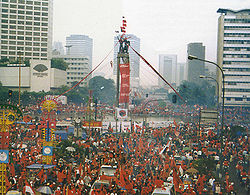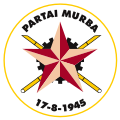| Name | Established | Dissolved | Notes | Independence method |
|---|
Indies Party
Indische Partij | IP | 1912 | 1913 | Advocated Indonesian independence. [58] | Non-cooperative |
| Insulinde, or Nationaal Indische Partij | NIP | 1913 | 1919 | Direct successor to the Indies Party, advocated in establishing an independent dominion for Indo people in the Dutch East Indies. [58] [62] | Non-cooperative |
Sundanese Circle of Friends
Paguyuban Pasundan | 1913 [nb 11]
1919 [nb 12] | 1942 [nb 13] | Advocated to preserve Sundanese culture by involving not only Sundanese people but all those who care about Sundanese culture and to pursue Indonesian Independence | Cooperative |
Communist Party of Indonesia
Partai Komunis Indonesia | PKI | 1914 | 1966 | Before 1920 as the Indies Social Democratic Association (Indische Sociaal-Democratische Vereeniging). | Non-cooperative |
Indies Catholic Party
Indische Katholieke Partij | IKP | 1917 | 1949 | Made as a response to the emergence of nationalist inlander movements, it represented Dutch totok Roman Catholic interests. It had close ties with its mainland counterpart, the Roman Catholic State Party. [63] | Dutch party |
Christian Constitutional Party
Christenlijk Staatkundige Partei | CSP | 1917 | 1942 | Before 1929 as the Christian Ethic Party (Christelijk Ethische Partij). Advocated to make the statutes of God, as revealed in the Holy Scriptures, nature, and history, the foundation of political life in the Dutch East Indies. Also invited native Indonesians, which was rare for a Dutch-majority party at the time. [64] Precursor to Parkindo. | Dutch party |
Indonesian Islamic Union Party
Partai Syarikat Islam Indonesia | PSII | 1923 | 1973 | Advocated Islamic socialism. | Non-cooperative |
Catholic Party
Partai Katolik | PK | 1923 | 1973 | Split from IKP. Advocated for Christian democracy for natives. [65] | Cooperative |
Indonesian National Party
Partai Nasional Indonesia | PNI | 1927 | 1931 | The first incarnation (second in 1945) of the significant party, which advocated Indonesian independence. | Non-cooperative |
Chinese Association
Chung Hwa Hui | CHH | 1928 | 1942 | Advocated Chinese rights in the Dutch East Indies. | Cooperative |
Indonesian Party
Partai Indonesia | Partindo | 1931 | 1936 | Advocated Indonesian independence. | Non-cooperative |
| National Socialist Movement in the Dutch East Indies Nationaal-Socialistische Beweging in Nederlands-Indië | 1931 | 1940 | East Indies branch of the NSB. Most of its members were Indos. | Dutch party |
Indonesian Chinese Party
Partai Tionghoa Indonesia | PTI | 1932 | 1942 | Advocated closer ties between Chinese and native Indonesians. | Cooperative |
Indonesian Fascist Party
Partai Fasis Indonesia | PFI | 1933 | 1933 | Advocated an independent Java, led by an ethnic Javanese descendant of Sutawijaya as its constitutional monarch, [66] ruling over a federation of kingdoms across Nusantara. [67] | Non-cooperative |
Great Indonesian Party
Partai Indonesia Raya | Parindra | 1935 | 1939 | National conservative party, that advocated for full political rights for Indonesians in a system of government in the Dutch East Indies. | Cooperative |
Indonesian People's Movement
Gerakan Rakyat Indonesia | Gerindo | 1937 | 1942 | Successor to Partindo, left-wing nationalist party. | Cooperative |
Indonesian Islamic Party
Partai Islam Indonesia | PII | 1938 | 1942 | Cooperative split from PSII. | Cooperative |



















































